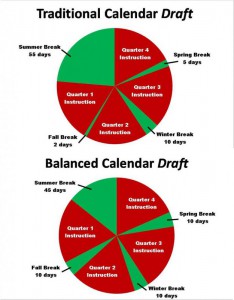Indianapolis Schools Convert to Balanced Calendar
by Lauren Pedigo
Numerous Indianapolis school districts will adopt a new calendar next year in hopes of improving attendance and reducing behavior problems.
A balanced calendar more evenly distributes breaks throughout the school year. Students have two weeks for
fall, winter and spring breaks. These changes leave a seven week summer break. During these two week breaks throughout the year, schools offer “intercessions,” a program for struggling and accelerated students.
Research suggests that adjusting the traditional school year calendar to a “balanced calendar” links to academic achievement.
Nationally, research shows that attendance, academic achievement and student and teacher attitudes improved
after schools switched to the balanced calendar. Dr. Stanley DeJarnett of the
University of Georgia studied 30 schools using the balanced calendar and
discovered that 17 recorded “significant” improvement in these areas while two
experienced a decrease. The remaining 11 districts did not show signs of change.
Schools that are switching
The Metropolitan School Distrcit of Warren Township began using an augmented calendar two years ago and first offered the balanced calendar as a choice for parents. After one year of use with the balanced calendar, the district experienced a one percent increase in attendance and a sixteen percent decrease in expulsions.
“It doesn’t matter what you call it, the point is is to reduce the summer gap, shorten the summer gap so you are not reviewing as much.” said Dr. Michael Wallpe, Associate Superintendent of Metropolitan School District of Warren Township.
Indianapolis Public Schools began using the balanced calendar this year. Principal Ron White said students living in poverty particularly benefit from this schedule because the shorter summer gap reduces learning loss over the summer. He explained that students from middle and upper income families tend to gain knowledge during the summer because students are exposed to new activities like museum visits or library reading programs. However, students living in poverty do not have these experiences.
“The effect of this calendar for students living in poverty is profound.” White said.
In November, Perry, Wayne and Franklin township school boards approved the use of the balanced calendar for
the upcoming school year. At least six other school districts in central Indiana, including Muncie, New Castle, Southern Hancock, Decatur Township, Beech Grove and Monroe-Gregg are also looking into it.
What teachers and administrators say
- “It’s time to get real about this. The days of the old agrarian calendar are over.” Dr. Michael Wallpe, Associate Superintendent of Metropolitan School District of Warren Township.
- “We believe we can create a culture of good attendance in school, that will help the academic achievement ultimately,” said Dr. Thomas Little, Metropolitan School District of Perry Township Superintendent
- “The effect of this calendar for students living in poverty is profound.” Indianapolis Public Schools principal Ron White said.
- “Sometimes for students, the time between January and spring break can feel like a death march. This calendar can help with that,” said Franklin Township Community School Corporation Assistant Superintendent Ron Blackgrave.
What Parents Say
The three districts gained insight about the switch from teachers, administrators, parents and students through surveys, blogs and open public forums.
“I’m grateful that I live in an area that you are thinking like this, outside the box and finding a solution,” said Perry Township parent Jill Guenther.
Other parents were concerned about obstacles associated with the new calendar including day care, work availability for high school students and extracurricular activities like sports and music competitions.
“I must say that when I stumbled onto the fact that this was even a consideration, my jaw dropped in disbelief,” said Perry Township parent Jeff Halper.
While the effectiveness of the calendar is still being determined, school districts are making the change and parents and students will adapt with the new schedule.

To read more about this subject visit MSNBC, WTHR, Hoosier Ed, The Indianapolis Star or The Indy Channel.









